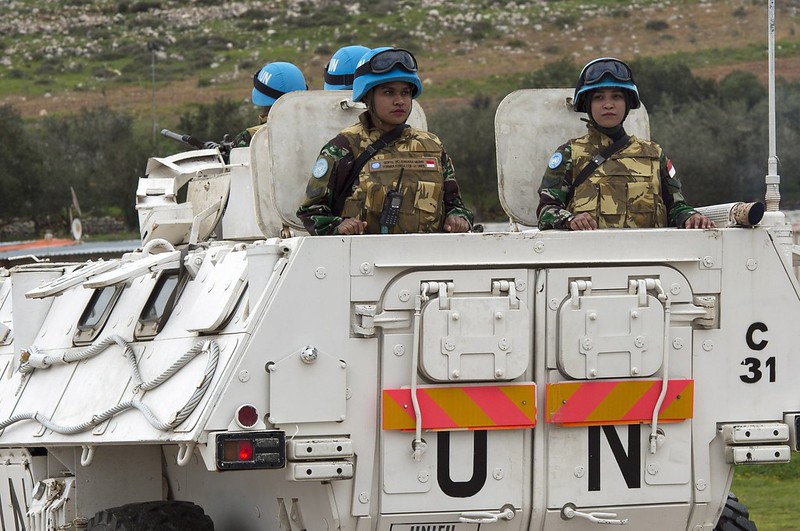
Engaging more women in UN peacekeeping
The United Nations designated ‘women in peacekeeping’ as the theme for this year’s International Day of United Nations Peacekeepers on 29 May. With women making up just 6% of uniformed personnel serving in UN field missions, the agency has emphasised the need to engage more women in ‘meaningful, equal and full participation in peace operations … and political processes’. Despite efforts within the UN and internationally, women still face ‘systemic barriers’ to participation in peacekeeping missions. Fiona Pearce, a wing commander in the Royal Australian Air Force, attributes the under-representation of women to institutional inertia, unconscious bias surrounding women in leadership roles, gender stereotypes, and a lack of role models to inspire younger women.
Gendered impacts of Covid-19
Analysis published by the London School of Economics has highlighted the importance of applying a gendered lens to understanding worldwide responses to Covid-19. The authors argue that since seven of the 10 countries most vulnerable to Covid-19 are conflict zones, there’s an urgent need to address the risks faced by women and girls in these settings. Involvement of women in shaping both the crisis response and long-term recovery plans will be key. Specific recommendations that can be drawn from the WPS agenda include funding women’s organisations and networks in conflict-affected areas, protecting female health workers on the front line of Covid-19, and prioritising programs aimed at preventing and responding to gender-based violence.
A report from the Gender, Peace and Security Centre at Monash University similarly looks at the impact of Covid-19 on the WPS agenda in the Indo-Pacific. It outlines how the loss of funding, income and job security during the pandemic has affected the scope and focus of WPS work in the region. The report argues that governments and international aid agencies need to recognise the value of the work being done by WPS organisations, particularly with regard to Covid-19 responses, and should provide targeted support for their activities.
Italian women call for inclusion
Italian women scientists, researchers, lawmakers and members of parliament, backed by the grassroots movement ‘Give Us Voice’ (#datecivoce), are demanding a more inclusive approach in the government’s Covid-19 response. None of the 20 members of Italy’s special coronavirus recovery commission are women, despite the fact that women make up a majority of those at the front lines in the country’s health emergency and that such work exposes them to great risks. Prime Minister Giuseppe Conte has responded to the criticism and pushed for action, but many women remain worried about the extra burden they are likely to face due to gender disparities and deep-rooted sexism, which could affect their future in the workforce after the pandemic.
A WPS framework for ceasefires
The Women’s International League for Peace and Freedom has released a new resource on how the WPS agenda can provide a framework for brokering lasting ceasefires. While the Covid-19 pandemic prompted calls for a global ceasefire, the UN Security Council has been unable to adopt a resolution on the issue. The resource urges the Security Council to step up its efforts to stop violent conflicts and enable humanitarian responses to stop human suffering. It also argues that any attempt at a global ceasefire must be tied to understandings of the gendered impact of conflicts, the role of women in promoting peace, and the importance of inclusivity and human security. Such an approach that incorporates the meaningful participation of women will be key to delivering sustainable and long-lasting peace.
Increasing women’s participation in Pacific security
Writing for the Australian National University’s Policy Forum, Anouk Ride and Meg Keen point out that women in the Pacific still lack influence in setting security agendas. Women’s participation in police, military and other security organisations remains low, fed by social norms that women shouldn’t use physical force or lead teams of men. There are a number of notable examples of security initiatives from women in the region, including women-led peace movements in Bougainville and Solomon Islands and services for violence survivors. Ensuring that women have a strong voice in policy- and decision-making, expanding the role of women in security, and ensuring that gender-sensitive goals are set and achieved are all crucial for better security outcomes in the region.
Dismantling the patriarchal peace and security culture
Miriam Bensky from the Centre for Women, Peace and Security at the London School of Economics argues that the reform of organisational culture is crucial in creating a peace and security field in which women want to work and lead. In order to change the patriarchal culture of the peace and security field, built-in biases and dominant norms and narratives will need to be addressed. Key recommendations include redefining leadership attributes, appointing more diverse leaders, seeking dissenting views in internal decision-making, and instituting policies of zero tolerance of sexual harassment, bullying and locker-room talk.
Monash University’s Gender, Peace and Security Centre
For those interested in furthering their understanding of gender, peace and security, in July and November this year, Monash University is offering two online post-graduate intensive units, at the end of which attendees will receive a Graduate Certificate of Gender, Peace and Security.

